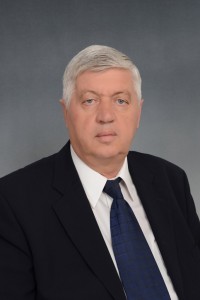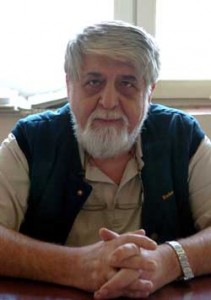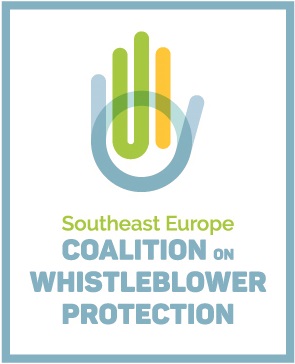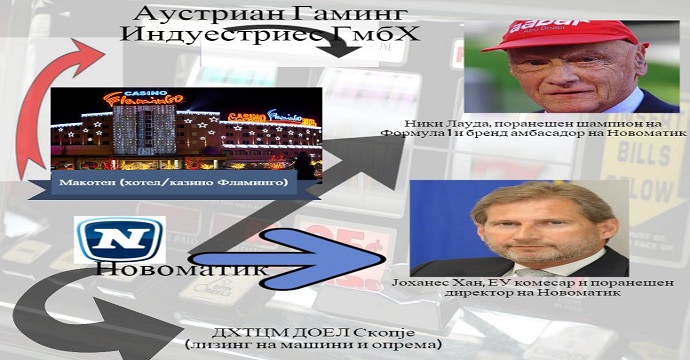(Note: Documents for all companies are attached on links to their names. To view them click on link DOCUMENTS)
Macedonia is at the bottom of the list of Balkan countries by foreign direct investments. Official figures show that in 2013 Macedonia attracted only 251 million Euros foreign investments, Montenegro 350 million, Bosnia and Herzegovina 300 million, while the same year Kosovo registered 259 million Euros.
However, not everything is so black. Games of chance are booming in the country. From 2009 to 2015 the Ministry of Finance in Macedonia licensed six casinos with 16 subsidiaries and a record 59 slot machine casinos.

prof. Dimko Kokarovski: All the research shows that the poorest layers of the population go and pay in betting shops. These 500 people are poor, and betting today they are becoming poorer for 50 denars, only one person earns. So there is unjust redistribution of income and poverty increases
“The greater the poverty, the bigger the number of betting shops and casinos”, says Dimko Kokaroski, former deputy finance minister and current professor at the Faculty of Economics in Prilep.
“The greater the poverty, the more people hope that some extra money can take them from the mud. Gambling has increased here. We have low standards and too much gambling”, he says.
The most attractive locations – places for gambling
Initiatives against this flood with newly open places for gambling are increasingly popping up. Many are bothered that the state allows these casinos to operate in the central areas of the cities, and require to be moved to the periphery, away from populated areas.
“I can say that in Prilep central locations are betting shops and casinos. The most beautiful locations in the city under Marko’s Towers are occupied by gambling industry”, said Professor Kokaroski.
Not only in Prilep but in almost all towns of Macedonia slot machine casinos are intensively opened, which attract the attention of passers-by with their spectacular lights that focus on the jackpot available.
From the Ministry of Finance they say that casinos and slot machines are taxpayers as any other entities in the market.
“Organizers of games of chance in casinos, in accordance with Article 66 of the Law on games of chance and entertainment games, for organizing games of chance pay a special fee amounting to 20 percent, which is calculated on the difference between the amount paid in all the machines of the organizer and the paid amount of all machines, on a monthly basis”, it is said in the written response from the Ministry, received under the Law on Free Access to Information.
But Professor Kokaroski believes that licenses given for operation of companies that organize games of chance are income to the budget, and they will neither encourage nor develop the economy.
“We have a situation where 100 or 500 people bet in betting shops, and one person wins”, he says.
“All the research”, says Kokaroski, “shows that the poorest layers of the population go and pay in betting shops. These 500 people are poor, and betting today they are becoming poorer for 50 denars, only one person earns. So there is unjust redistribution of income and poverty increases”.
He believes that the social cost, as rise in alcoholism, drug addiction, domestic violence and crime, is much greater than the benefit that the society and the state have from charging income from licenses in the budget.
“Children, even very young, are in contact with gambling as a vice. Although prohibited by law, however, they enter betting shops etc. Later there is a need for special programs for resocialization of these children and it will cost the state money”, says Kokarovski.
Ownership structure
Austrian companies and companies from countries with tax incentives, which are known as offshore financial centers, are the biggest players in the Macedonian market of games of chance. The growing interest in investing in this sector has contributed Macedonia to be called Balkan Las Vegas.
According to the documents available to SCOOP – Macedonia, the casino “Hit International” is owned by Kiro Kostovski from Skopje and the domestic company “Mint International” from Gevgelija. As owner of this company occurs the offshore company “Mint International Limited” based in the islands of St. Kitts and Nevis.
Casino “K.A.K” is owned by the company “Basan Holdings PTI LTD” from Australia and Macedonian citizen Ognen Cigovski.
“Makoten” is owned by “Austrian Gaming Industries GmbH”, a company owned by the group “Novomatic AG” from Austria. This Austrian company is the founder of the company “HTL Macedonia DOOEL Skopje”, which owns slot machines “Ma Gaming” and “Masterbet”. Novomatic group, which became known for the fact that in the period from 1997 to 2003 its director was the current enlargement commissioner Johannes Hahn, is present in Macedonia through the company “DHTCM DOOEL Skopje”, which gives machines, equipment and tangible goods under lease or by leasing.
Famous Formula 1 champion Niki Lauda is a brand ambassador of Novomatic.
Casino “Corona International” is owned by two companies from offshore countries: “Altona Holding S.A.” from Panama and “Stellar International S.A.” from the Marshall Islands.
The world-famous chain of casinos “Princess Group” of the Turkish businessman Sudi Ozcan, has been in Macedonia since 2003, but started working about 6 years ago. Their casino is owned by the company “IRADA Stock Company” based in Liechtenstein. Ozcan, according to the Organized Crime and Corruption Reporting Project (OCCRP) has in Turkey been accused of concealing income and money laundering, and has also faced problems in other countries where he is expanding his business, such as Panama and Bulgaria.
Owners of slot machines “Astra” are Ivana Gruber-Muftich from Great Britain, Svetozar Nedeljkovic from Serbia and Petar Grubach from Slovenia. Owners of the Slovenian company “Interkvatro DOO Portoroz” are Zoran Jesich and Ivana Grubar-Muftich. This company, Gruber-Muftich and Petar Grubach, along with the company “Moneda Investments” from Luxembourg appear as owners of casinos “Flamingo”.
Slot machines “Matrix” is owned by Borce Shishovski, “Gaming International” of Vladimir Paunovski, “Casino Mercury” of Gjulnear Alimi, “Divien” of Vesna Belisheva and Vesna Nenova, while “King Slot” is owned by Mirko Nikolov, Elizabeta Kitanova-Velkova and Toni Kitanov.
Casino “Senator” is owned by the Dutch company “Flamingo Participations BV” based in Amsterdam. “Apex MK”, a company with a gambling license, has rather complex ownership structure. Four companies appear as its owners: “Kall Max DOO Skopje” and Austrian companies “Alex Holding GmbH”, “INTGH participation and Consulting GmbH” and “Unio Beteiligungs GmbH”.
Gambling as a disease
The offer of these casinos and slot machines is becoming increasingly attractive for people who hope for quick turnaround. There are also people seeking help to quit gambling. Unlike developed countries where poker and games of chance are perceived as fun, in countries with low living standard gambling is seen as a dangerous addiction that needs to be treated.
“I do not know how to save myself from gambling. Wherever I turn I see casinos. It attracts me, it pulls me to get inside and try my luck”, says a 44-year-old man who wished to remain anonymous. He is married and has three children.
“We all have dreams and plans for a better life. About 10 years ago I wanted to try my luck. Then I won the jack-pot of about 5 thousand Euros. I thought I was on the right track to have a better standard. But I was wrong. I lost everything and got into debts”, says our interlocutor.
He says that in the first years he hoped and gambled to earn money, and in the last to recover the lost.
“If I return all the money that I lost gambling in these 10 years I might give up. I am sinking. As soon as I have money in my hands something leads me to try my luck at the slot machines. I cannot resist, even though I my wife, children, friends, do not trust me anymore. I do not know how to stop…”, says our interlocutor.

dr. Pavle Pavlov: When there is great poverty people are increasingly turning to gambling. The higher the poverty, the more gamblers, it is directly proportional
Psychiatrist Pavle Pavlov believes that gambling is not always a disease, but if it turns into an obsession then it should be treated.
“We have to first diagnose gambling as a disease. If we give up to 10 percent of income for games of chance then gambling is not a disease. If you exceed this limit, then gambling is already risky, later it can turn into a habit”, he says.
According to Pavlov, gambling is in the group of addiction diseases, such as alcoholism or food addiction.
“Gambling has been increasing since the independence. Unlike now, in communism, we, Macedonians, could not enter the casino. It was only available to foreigners. Therefore, availability of games of chance encourages addicts to play more”, says Pavlov.
“When there is great poverty”, he points out, “people are increasingly turning to gambling. The higher the poverty, the more gamblers, it is directly proportional”.
“Stages in gambling are: entertainment, risky gambling and addiction. When a gambler becomes addictive, he must play. When he is in crisis, he is prepared to sell the house, to lend money even with 10 percent daily interest. It kills them, they live by borrowing money. Then there is crime to be able to provide the money”, says Pavlov.
In most countries the number of casinos is limited and they are located outside the settlements.
For example, throughout Greece there are only a few casinos. In Thessaloniki there is one and another on the fingers. Then there is in Athens and on some island, that is it. In the US, there are casinos only in Las Vegas and in some other city. Elsewhere there are no casinos.
And doctor Pavlov believes that casinos and betting shops betting should be away from cities.
“The number of people in one betting shop or in a casino should be limited. It should be prohibited for minors, and I think here even juveniles are allowed in casinos and betting shops. The state has introduced licenses for games of chance, and I think they reduce the number of gambling facilities. They have to pay big money for licenses”, says Pavlov.
“It is not just the financial aspect”, he says, adding that “gambling can contribute a lot to the growth of addiction and growth of crime.”
(The story was is supported within the NED project “Raising Awareness about Corruption through Investigative Reporting”)





